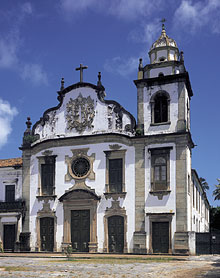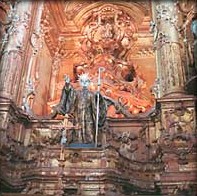Brazil - The Making of a Novel - Part 18
The Journey - Recife July 28 -- August 13, 1980
The Journey - Recife July 28 -- August 13, 1980
August 2: Today was spent at a Benedictine monastery, Monasteiro São Bento, in company of Edson Nery, as guest of Dom Basilio Penido and Dom Felix Bruneau. For one who has often stayed a distance from the church, a day in the company of the monks was a deeply moving experience.
 |
| Monasteiro São Bento |
What does one on the outside know about monks, cloisters, liturgy, Gregorian chants? Painfully little, so that you are surprised to find that life is very normal. Started at 10:30 and attended various offices with the monks, 1st at 10 to 12, then vespers at 5:30, mass (1/2 plus communion), then completa at 8.00 p.m.
Was surprised in talks with Dom Penido and Dom Bruneau to find just how involved they were with the world, though still maintaining aspects of the past as in their cells. Took my afternoon rest in a cell prepared for me: traditional monastic term for what is really a large room bereft of worldly possessions, a bed, bureau and two chairs. Deeply moved during various services by the chants, psalms sung by choir, the melodiousness of their voices echoing in lofty 1761 church, the intonations reaching deep within oneself.
a cell prepared for me: traditional monastic term for what is really a large room bereft of worldly possessions, a bed, bureau and two chairs. Deeply moved during various services by the chants, psalms sung by choir, the melodiousness of their voices echoing in lofty 1761 church, the intonations reaching deep within oneself.
 a cell prepared for me: traditional monastic term for what is really a large room bereft of worldly possessions, a bed, bureau and two chairs. Deeply moved during various services by the chants, psalms sung by choir, the melodiousness of their voices echoing in lofty 1761 church, the intonations reaching deep within oneself.
a cell prepared for me: traditional monastic term for what is really a large room bereft of worldly possessions, a bed, bureau and two chairs. Deeply moved during various services by the chants, psalms sung by choir, the melodiousness of their voices echoing in lofty 1761 church, the intonations reaching deep within oneself.
Dr. Nery is a wonderfully compassionate, aesthetic man who undoubtedly belongs among the brothers. Somewhat difficult to speak to because it seems he is in process of withdrawing from the world we know and may well enter the monastery.
Today was a great contrast to Saturday's event. First drove with Amalia Correa around Recife and Olinda. I now understand the topography, Tamaraca, Iguaraçu, Pão Amarelo, Olinda, Recife, Guarapes are no longer mere names. I look forward to returning to my books and re-reading material with a deeper understanding.
Saturday night was yet another contrast with Roberto Motta, religious anthropologist and his gay theatre/art friends. They drink like fishes, hug each other fervently, and between this, argue politics.
Silvio, a black man, proves most illuminating. With Roberto, he's off to a Brazil-Africa conference in Rio on Monday, the first of its kind. Silvio makes an interesting point about racism: The world laughed when Emperor Bokassa (Central African Republic) was crowned calling him “a stupid black etc.” But the world rejoices with Charles and Diana...
Ended evening at gay bar in Casa Forte with more political talk, little of which I could follow except to realize that the 25-35 generation of intellectuals in Brazil is seething, all attention directed toward the November 15, 1981 elections, the first democratic elections since 1964.
I'm beginning to see why military presence is so obvious in Pernambuco. There is an atmosphere of rebelliousness about the place.
At so many levels beyond the “haves” and the “playground” people, there is chronic poverty.
A dramatic example of this is Recife Yacht Club: To get to it you drive for miles through “Brasília Teimoso,” a favela that started as a squatter camp at the same time as the new federal capital. The streets are pools of filthy water, no sewers, little lighting, a mix of permanent houses and shacks.
 |
| Bridge to God's Island, Recife 2014 Behind the Façade, This Is God’s Island |
Keep encountering comments and evidence of racism and color differentiation. As Silvio said, he asked a top general why there were so few black generals in Brazil. Man replied that no more than fifty black people in senior posts in the country.
I wonder how Gilberto Freyre reconciles his interpretation of a “New Man” in the tropics with the reality expressed by so many people I meet of racism in Brazil - of the innumerable “classifications” of color, once relatively harmless and superficial but assuming a more serious nature as jobs get scarcer, poverty worsens and color deepens. This all strikes this ex-South African observer sharply. Brings to mind, too, the confusingly contradictory attitude of the South African Progressive—type.




No comments:
Post a Comment